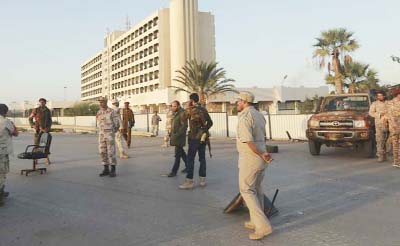
AFP, Rome :Italy on Wednesday issued its strongest warning yet about the danger of the Islamic State group establishing a stronghold in Libya that would threaten Europe’s security and the stability of neighbouring states.Addressing parliament, Foreign Minister Paolo Gentiloni said there was an “evident risk” of IS fighters in Libya forging an alliance with local militias or criminal gangs currently engaged in a multi-sided battle for control of the country.He also warned that time was running out for the troubled north African state, and called for a “change of pace” in the international community’s efforts to restore stability to a country that has descended into chaos.”There is an evident risk of an alliance being forged between local groups and Daesh and it is a situation that has to be monitored with maximum attention,” Gentiloni told MPs. Daesh is the Arabic acronym for IS.Gentiloni said it was clear the situation in Libya had deteriorated in recent weeks, raising the risks faced by Italy and neighbouring countries.”We find ourselves facing a country with a vast territory and failed institutions and that has potentially grave consequences not only for us but for the stability and sustainability of the transition processes in neighbourging African states.”We have to be clear, the situation has deteriorated. The time at our disposal is not infinite and is in danger of running out soon.” Gentiloni stressed that Italy believed the solution to Libya’s problems was political, not military.”Saying we are in the front line does not mean announcing adventures nor crusades,” he said.Meanwhile, on the surface life looks normal in the Libyan capital. Cafes are bustling with customers sipping cappuccino, while well-stocked shops sell anything from Italian underwear to French cheese.But as in the days of Muammar Gaddafi, many residents prefer to avoid talking politics in Tripoli, where a self-declared government has ruled since an armed faction called Libya Dawn seized the capital by expelling its rivals in August.Across Libya to the east, where the internationally recognized government operates and a former general is battling Islamist militants, many Libyans are just as wary, fearing any criticism will see them branded as traitors or worse.The oil-producing nation is now effectively split in two with the internationally recognized Prime Minister Abdullah al-Thinni confined to the east since losing control of Tripoli and a rival administration controlling the capital and its surroundings.Both governments are backed by former rebel brigades who united to topple Gaddafi in 2011 but have since turned their guns on each other as Libya slides toward a wider civil war.The heavily armed groups have been fighting on different fronts for territory and control of oil ports. Hundreds of civilians have been killed and 400,000 displaced inside Libya since the summer, according to the United Nations.With the country polarized between the two rival factions who dismiss each other as traitors, terrorists or war criminals, many Libyans explain that, as in the Gaddafi era, it’s best to say little and avoid trouble.

